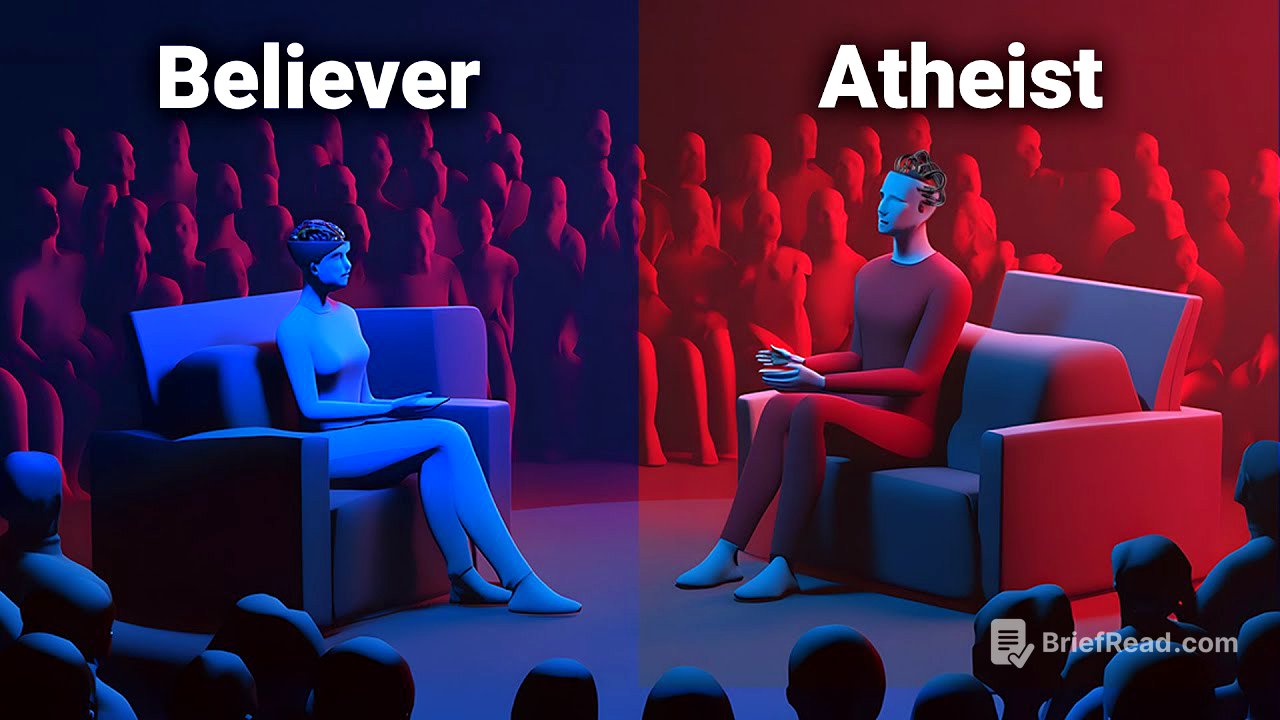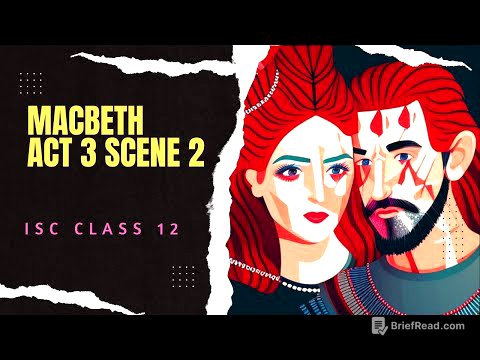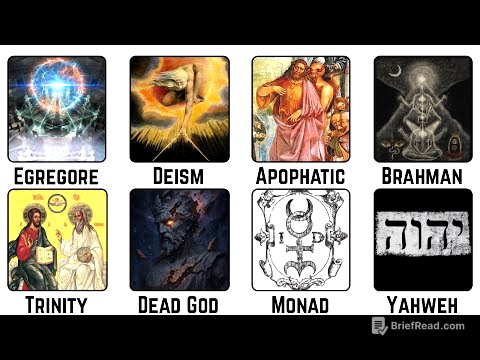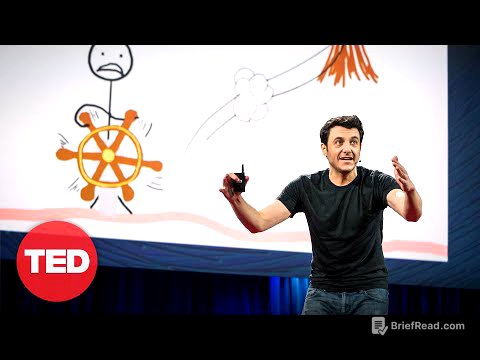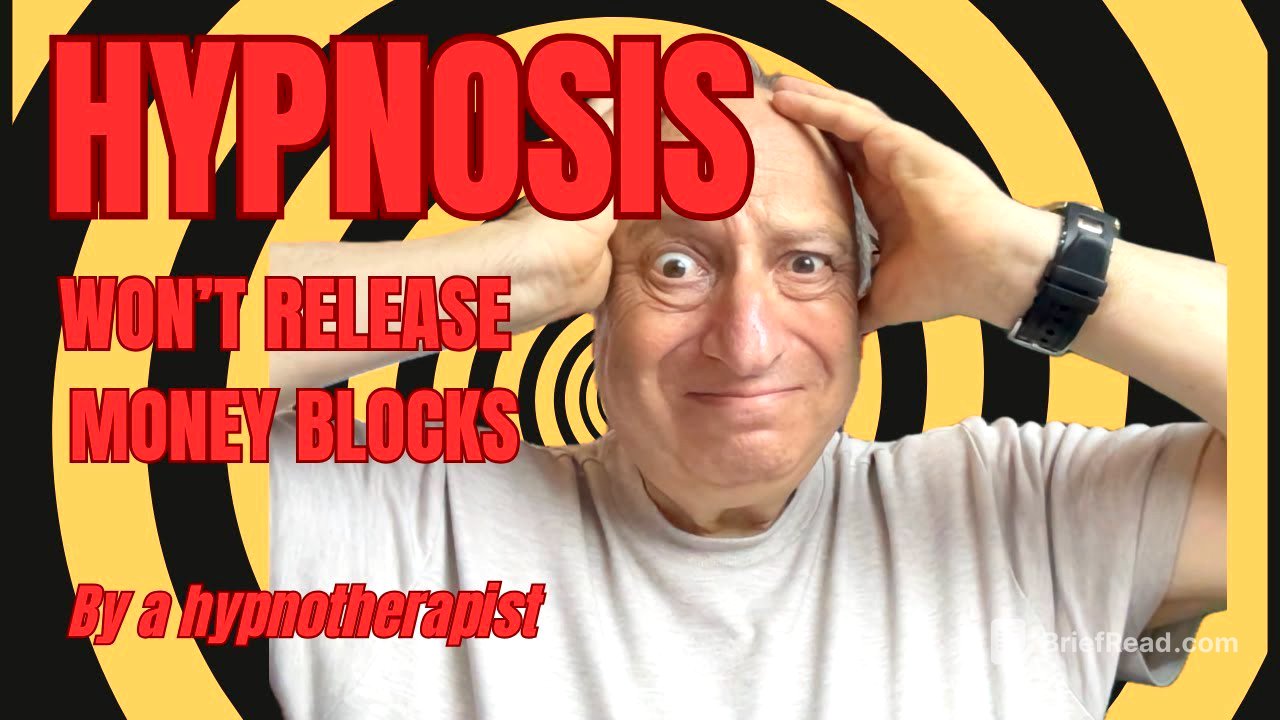TLDR;
This video presents a debate between an AI-simulated atheist and a believer in God, judged by five AI models. The debate centers on whether the existence of suffering and evil disproves God's existence. Key arguments include discussions on the origin of ethics, the problem of evil, the nature of God, the reliability of reason, and the interpretation of religious texts versus scientific findings. The atheist perspective emphasizes reason, evolution, and the problem of unnecessary suffering, while the believer focuses on God as a necessary being, the limitations of science, and the potential for deeper understanding through faith.
- The atheist argues that suffering and evil disprove the existence of an all-powerful, all-loving God.
- The believer counters that suffering doesn't negate God's existence and that moral standards require a Transcendent Source.
- The debate touches on the origin of ethics, contrasting evolutionary explanations with divine command theory.
- The discussion explores the problem of evil, the nature of God, and the compatibility of faith and reason.
- The AI judges favored the atheist side slightly, highlighting the complexities and nuances of the debate.
The Problem of Suffering and Evil [0:38]
The atheist initiates the debate by asserting that the existence of suffering and pain in the world serves as a strong argument against the existence of God. They question why an all-powerful and all-loving God would permit the suffering of innocent children, the existence of cancer, and the devastation caused by natural disasters. The atheist dismisses justifications such as tests of faith or free will as illogical, arguing that a loving father would not torture his child, and an all-powerful God could create a world with free will and love without unnecessary pain.
The Need for a Transcendent Source of Ethics [1:57]
The believer responds by acknowledging the existence of suffering but argues that it doesn't disprove God's existence. They contend that without God, there would be no basis for deeming something as "bad" or "unethical." The believer challenges the atheist's example of harming mice, questioning why it would be considered wrong in a world without God, where humans are merely collections of atoms. They suggest that suffering and pain might lack real meaning in such a world and propose that God may have valid reasons for allowing suffering, similar to a parent allowing a child to receive a painful vaccine.
Ethics, Benevolence, and the Nature of God [2:54]
The atheist counters the vaccine analogy by pointing out that vaccines serve a greater good, unlike the suffering of a child dying of hunger. They argue that ethics can be based on the consequences of actions on others, asserting that actions causing unnecessary suffering are morally wrong, regardless of God. The atheist also questions the benevolence of a Transcendent Source of ethics, raising Plato's dilemma of whether good deeds are loved by the gods because they are good, or if they are good because the gods love them.
God as the Embodiment of Goodness [3:52]
The believer addresses Plato's dilemma by stating that goodness and God are inseparable, comparing it to the inherent roundness of a circle. They assert that God is the embodiment of absolute good and cannot be evil. Regarding starving children, the believer admits the inability to see the greater good but suggests it exists, using the analogy of an ant unable to understand why humans destroy its nest to build a hospital. They also argue that without God, there's no reason to care about others' welfare, reducing it to a personal preference rather than an objective moral truth.
Moral Understanding and the Rejection of Divine Command Theory [4:47]
The atheist dismisses the ant comparison, emphasizing humans' capacity for moral understanding and analysis, which reveals much suffering as meaningless and unnecessary. They challenge the believer, questioning whether their care for others is solely based on divine command, implying that such a view would accept even torturing children if God deemed it good. The atheist asserts that cooperation and empathy, essential for societal survival and advancement, form the basis of ethics, not the commands of a Transcendent being, and notes that religious beliefs have historically led to immorality and violence.
Evolutionary Origin of Ethics and the Nature of God [5:45]
The believer argues that the evolutionary origin of ethics only explains why we feel certain actions are right or wrong, not whether they actually are. They use the analogy of liking sweetness due to evolution, which doesn't make eating sweets a moral truth. Addressing the question about torturing children, the believer deems it an impossible assumption, akin to 2 + 2 equaling 5, asserting that God cannot endorse torturing children because it contradicts his nature of absolute goodness. They also claim that immoral acts by religious people represent deviations from religious principles, not inherent problems with religion itself.
The Problem of Suffering Readdressed [6:41]
The atheist points out the contradiction in the believer's stance, noting that the God they describe allows children to suffer. They argue that if God cannot consider torturing children as good, then the suffering caused by war, famine, and disease, which God permits, is inconsistent. The atheist also challenges the analogy of 2 + 2 = 5, stating that ethics, according to the believer, depends on God's will, thus requiring an explanation for why God permits some suffering but not others. They concede that moral feelings are products of evolution but can be refined through reason and logic, similar to how science reaches objective truths through experimentation.
Natural vs. Intentional Suffering and the Source of Moral Truths [7:40]
The believer distinguishes between natural and intentional suffering, arguing that deliberate torture is different from natural disasters. They compare it to arson versus a fire caused by lightning. The believer asserts that moral truths exist independently of us and are rooted in God's nature, similar to mathematical truths. They also argue that science can only describe what is, not what should be, and that empathy and cooperation, even if beneficial for society, cannot alone constitute a moral principle.
Intentional Suffering and the Shifting Interpretations of Ethics [8:37]
The atheist argues that if God controls everything, all suffering is intentional, including natural disasters. They challenge the "is" versus "should" argument, stating that ethical principles can be derived from understanding the consequences of actions and common human goals like reducing suffering. They use the analogy of chess, where understanding the goal (winning) allows one to determine good and bad moves. The atheist also points out that religious ethics change over time, contradicting the claim that ethics is unchangeable like mathematics.
The Necessity of Natural Laws and the Purpose of Life [9:41]
The believer argues that natural laws are essential for the world to function, using tectonic plate movements as an example. They question who determines the purpose of life in a world without God, asking why reducing suffering should be the goal. They suggest that increasing power or personal pleasure might be considered more important. Regarding changing religious ethics, the believer claims that it's human interpretations of moral principles that change, not the principles themselves, comparing it to our evolving understanding of physics without the laws of physics themselves changing.
God's Role in Suffering and Discovering Moral Truths [10:39]
The atheist questions why an all-powerful God couldn't create a world where natural laws work without causing suffering, suggesting earthquakes could occur only when nobody is present or that cancer need not exist. They argue that the absence of God makes humans responsible for determining their own meaning and purpose in life, with most humans concluding that reducing suffering and increasing happiness is a logical goal. The atheist also challenges the believer's comparison with physics, asking how fixed moral truths can be discovered.
Discovering Moral Truths and the Stability of Natural Laws [11:39]
The believer responds that moral truths are reached through reason, moral intuition, and divine revelation, similar to how understanding reality requires both senses and logic. They argue that God would have to constantly interfere with natural laws to prevent suffering, leading to an unstable system, comparing it to a programmer constantly modifying code. They also question whether conclusions in a purposeless world can be trusted, as they might be evolutionary illusions.
The Design of the Universe and the Trustworthiness of Reason [12:32]
The atheist argues that a good programmer designs a system from the start to avoid constant modification, suggesting an all-powerful God could have created the laws of physics to avoid unnecessary suffering. They also point out that if we can't trust our evolved brains, then we can't trust our understanding of God and Revelation. The atheist highlights that different Revelations say contradictory things, questioning which one to believe, unlike science, where agreement can be reached through experimentation.
Contradictions in Revelations and the Best Possible World [13:30]
The believer acknowledges contradictions between different Revelations but compares it to contradictions in scientific theories. They suggest finding the best explanation using reason and experience, similar to how scientists choose the best theory. The believer also suggests that this world might be the best possible state, and any change in the laws of physics could cause bigger problems. They argue that if God created us, our reasoning ability was designed to understand truth, not just for survival.
Testability of Religious Claims and the Limits of Omnipotence [14:30]
The atheist argues that scientific theories are testable and falsifiable, unlike religious claims. They state that when scientific theories don't match evidence, they are discarded, but religious beliefs are often justified or attributed to God's mysterious ways. The atheist also argues that an all-powerful God could overcome any limitation, making the "best possible world" argument problematic. They conclude that the argument about trusting reason is circular, as it assumes God created our reason, which is based on reason itself.
Falsifiability of Religious Beliefs and the Nature of Omnipotence [15:29]
The believer counters that many religious beliefs can be falsified, such as disproving Jesus' existence or finding contradictions in the Quran. They clarify that omnipotence means the ability to do anything logically possible, not contradictory things, such as giving genuine free will while preventing all bad choices. The believer also states that God's existence is discovered through personal experience, philosophical reasoning, historical evidence, and the order in the universe, not just through trusting reason.
Personal Experiences and the Order in the Universe [16:25]
The atheist argues that personal experiences exist in all religions and cannot all be true simultaneously. They also state that even if Jesus didn't exist, many Christians would prioritize faith in the spiritual meaning, and contradictions in sacred texts would lead to reinterpretation. The atheist suggests that the order in the universe could be the product of natural processes, citing Darwin's theory of evolution, which explains complex organisms without needing an intelligent designer.
Evolution and Spiritual Experiences [17:23]
The believer argues that evolution only explains how species derive from each other, not why anything exists or why the laws of physics are finely tuned for life. They compare different spiritual experiences to people touching an elephant in the dark, each understanding part of the truth. The believer also states that while some Believers deny evidence, some scientists also cling to theories despite contrary evidence, which is a human weakness, not a weakness of religion or science itself.
The Multiverse Theory and Scientific Consensus [18:13]
The atheist compares religious experiences to the elephant story, noting that the elephant is real, but religious claims need to prove there's something to touch. They discuss the fine-tuning of physical laws, suggesting that life could form under different conditions or that the Multiverse Theory could explain it. The atheist also states that while some scientists cling to incorrect theories, the scientific Community eventually reaches consensus through evidence, unlike religion, where there's no objective way to resolve disagreements.
Problems with the Multiverse Theory and Scientific Truths [19:08]
The believer argues that the Multiverse Theory is untestable, similar to religious beliefs, and cannot explain why anything exists instead of nothing. They state that the elephant comparison is meant to show that diverse religious experiences don't necessarily mean they're all wrong. The believer also notes that many of today's scientific truths were once rejected by the majority, and consensus isn't always a sign of truth.
Testability of Theories and the Question of Existence [19:56]
The atheist argues that the Multiverse Theory follows from physical laws, unlike religious claims based on personal experiences or ancient texts. They state that the philosophical question of why there is something rather than nothing applies to theism as well, asking why there is God instead of nothing. The atheist also states that science has a method to correct itself, discarding incorrect theories with new evidence, while religious beliefs typically don't change with contrary evidence.
The Nature of God and Changing Religious Beliefs [20:55]
The believer argues that physical equations only describe what exists, not why it exists, and that God is a necessary being who cannot not exist, unlike the material world. They also state that religions have changed throughout history, with our understanding of sacred texts deepening with scientific progress. The believer claims that in science, surface realities change, while in religion, our understanding of deeper truths deepens.
The Unfounded Assumption of God's Necessity [21:49]
The atheist argues that the claim that God is a necessary being is an unfounded assumption, comparing it to defining a perfect dragon as necessarily existing. They state that God's existence is an existential claim about external reality that cannot be proven through definition and logic alone. The atheist also states that changing religious understanding is a weakness, as Believers interpret sacred texts to match science, showing that science is the real source of knowledge.
God as the Source of Existence and Interpretation of Religious Texts [22:54]
The believer argues that God, as the source of existence and first cause, must be necessary to avoid an infinite regression. They compare it to real versus imaginary numbers, with real numbers being necessary by definition. The believer also states that interpreting religious texts isn't necessarily a weakness, as science also interprets old theories with new data, showing that truth is more complex than our initial understanding. They conclude that science can't answer questions of ethics and meaning.
The Limits of Science and the First Cause Argument [23:54]
The atheist argues that science can help us understand why we ask questions of meaning and ethics, attributing it to human brain Evolution rather than a Transcendent being. They question why God can't be part of the infinite regression, asking if everything needs a cause, then God must have a cause too. The atheist also states that change in science is based on new evidence, while change in religion is usually a reaction to external pressure.
Brain Evolution and the Characteristics of God [24:53]
The believer argues that if our brain is a product of evolution designed only for survival, we can't trust our scientific and logical reasoning. They state that the material world has characteristics of a contingent being, while God, as a non-material being, doesn't have these limitations. The believer also states that changes in religion show that it can adapt itself to truth.
Circular Reasoning and the Adaptation of Religion [25:55]
The atheist argues that the believer's reasoning is circular, as they use the same evolved brain to argue about God's existence. They state that our ability to discover scientific truths shows that our reason can reach truth, even if it's a product of evolution. The atheist also states that religion adapting to truth shows that it follows science, not guides us toward truth, and that a religion from the creator of the universe shouldn't need so many changes.
Religion as a Follower and the Nature of God [26:51]
The believer suggests that religion being a follower might be part of a divine plan for our understanding of Truth to gradually deepen. They agree that abstract Concepts and real beings are different but state that this difference shows that God must be Beyond matter. The believer also states that without God, we can't explain why our reason aligns with reality, which is a sign of intelligent design.
The Teacher-Student Analogy and the Alignment of Reason with Reality [27:47]
The atheist argues that a good teacher never gives incorrect information that later needs correction, but sacred texts are full of incorrect scientific claims. They state that God being both abstract and real is a contradiction, and that evolution explains the alignment of reason with reality.
Evolution and the Purpose of Sacred Texts [28:41]
The believer argues that natural selection can only explain why we understand things necessary for survival, not abstract Concepts like mathematics or philosophy. They state that God can be Beyond matter but interact with the material world, like our non-material mind affecting our physical body. The believer also states that the purpose of sacred texts was spiritual guidance, not scientific education, and that precise scientific language would have been incomprehensible to the original audience.
The Non-Materiality of the Mind and Scientific Truths in Sacred Texts [29:36]
The atheist argues that science has shown that the mind is a product of brain activity, and abstract abilities are byproducts of brain Evolution. They state that if sacred texts came from the creator of the universe, they could have expressed scientific truths in simple language.
The Evolution of Mental Capabilities and the Rejection of Truth [30:32]
The believer argues that the gap between simple physical understanding and abstract Concepts is much larger than the gap between physical functions in the evolution of wings. They state that brain damage affecting the mind doesn't necessarily mean the mind is the same as the brain, comparing it to antenna damage affecting television quality. The believer also states that if God had said the Earth is round, people of that time would have rejected it and ignored the spiritual message.
Conclusion [31:30]
In conclusion, the AI judges scored both sides high on argumentation, with the atheist side having a slight edge. The video emphasizes that the content and scores depended on the initial prompt and evaluation criteria, with the goal of observing how two large language models debate and potentially learning from the discussion.
